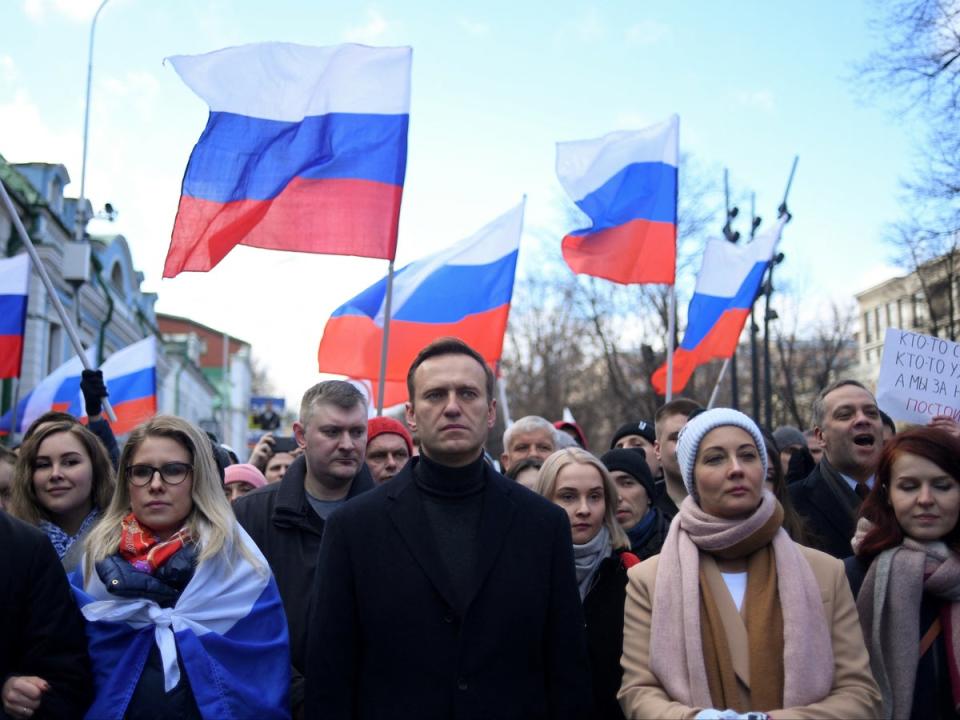Navalny issued chilling warning about second Trump term in final letters from prison
Alexei Navalny issued a chilling warning about what a second presidential term for Donald Trump could mean in one of his final letters before he died in an Arctic prison last week.
According to The New York Times, which has collected together some of the late Russian dissident’s correspondence from jail, Navalny worked hard to stay in touch with global politics from his cell at the “Polar Wolf” penal colony, around 1,000 miles northeast of Moscow.
The staunch opponent of Vladmir Putin also read voraciously from Tolstoy, Dostoyevsky, Chekhov and Solzhenitsyn to occupy his mind and prevent himself from sinking into despair amid the brutal conditions in which he was held.
In one 3 December letter to Evgeny Feldman, a photographer who covered his attempted run for president in 2018 and now lives in exile in Latvia, Navalny wrote that he feared that if anything should happen to President Joe Biden – a distinct possibility, he felt, given the American’s advanced age – “Trump will become president”.
To Navalny, a second Mr Trump term was a “really scary” prospect for the wider world.
“Doesn’t this obvious thing concern the Democrats?” he asked Mr Feldman, apparently incredulous that 81-year-old Mr Biden is pursuing a second term rather than yielding to a younger successor to take on Mr Trump, who looks all but certain to be the Republican nominee again this year.
Elsewhere in the correspondence, Navalny expressed a nostalgia for spicy foreign cuisine like the Turkish kebabs he enjoyed while recuperating in Berlin, Germany, after being poisoned with Novichok.
He also wrote about how moved he had been after reading an obituary of the Friends actor Matthew Perry and told Mr Feldman: “Everyone usually thinks that I really need pathetic and heartbreaking words but I really miss the daily grind – news about life, food, salaries, gossip.”
Of the unthinking obedience of his captors, he ominously told another friend, media entrepreneur Ilia Krasilshchik: “If they’re told to feed you caviar tomorrow, they’ll feed you caviar. If they’re told to strangle you in your cell, they’ll strangle you.”
For his part, Mr Trump was criticised for not saying anything when Navalny’s death was announced on Friday.
He finally broke his silence on his death on Monday – only to draw an entirely self-serving comparison between Navalny’s fate and his own legal problems, while failing to condemn Mr Putin.
“The sudden death of Alexei Navalny has made me more and more aware of what is happening in our Country,” the Republican wrote on his Truth Social platform.
“It is a slow, steady progression, with CROOKED, Radical Left Politicians, Prosecutors, and Judges leading us down a path to destruction.
“Open Borders, Rigged Elections, and Grossly Unfair Courtroom Decisions are DESTROYING AMERICA. WE ARE A NATION IN DECLINE, A FAILING NATION! MAGA2024.”

That message came after a week in which Mr Trump had come under fire for saying that, should he return to power, he would let Russia “do whatever the hell they want” to any of America’s Nato allies that failed to keep up their defence contributions to the military alliance.
His latest crass intervention was slammed by former House speaker Nancy Pelosi in an interview with MSNBC’s Jen Psaki on Monday evening, on her return from the Munich Security Conference in Germany where she met Navalny’s grieving widow Yulia Navalnaya.
“What does he have on Donald Trump that he has to constantly be catering to Putin?” she said of the Russian dictator, invoking the possibility that the Kremlin may have kompromat on the US presidential hopeful – something that was first suggested in a speculative dossier compiled by the British spy Christopher Steele in 2016.
“I don’t know what he has on him, but I think it’s probably financial. Or something that he expects to get.”
Working herself up into a fury, Ms Pelosi went on to call the Republican candidate Mr Putin’s “buddy in vileness” and said that his post about Navalny “shows you he is a person without values” and his remarks “beneath the dignity of a human being” to express.

 Yahoo News
Yahoo News 
